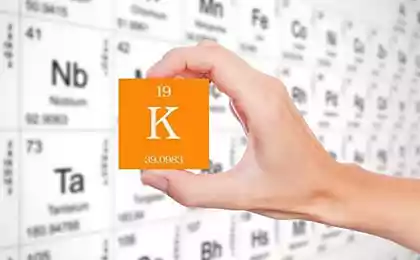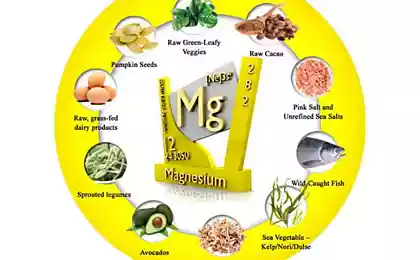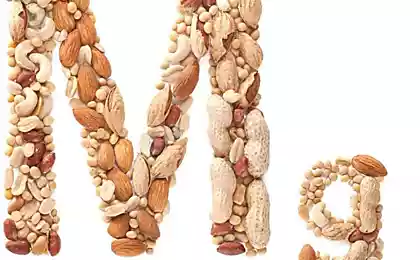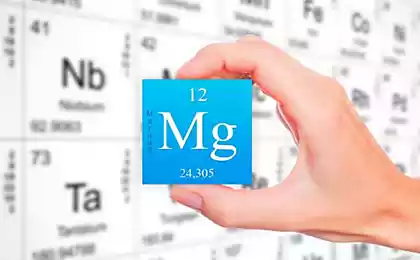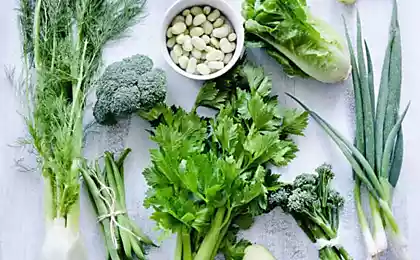665
Potassium: an IMPORTANT regulator of metabolism in the human body
Formula health: potassium is to soft tissues, calcium for solid.
Potassium (K)
In the human body potassium is involved in the intracellular metabolism, regulating heart rate and fluid and electrolyte balance is an important regulator of metabolism and the osmotic pressure, is involved in the activities of the nervous system. It happens due to potassium the transmission of nerve impulses from neuron to neuron.
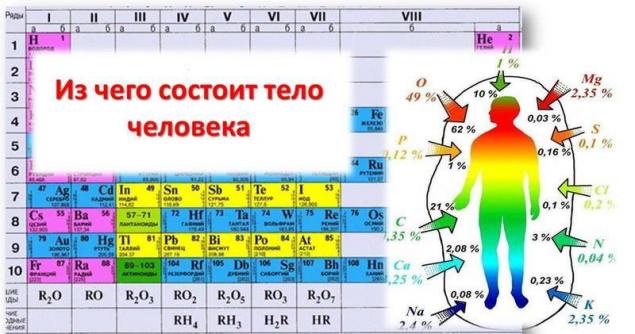
In the body is maintained a constant level of potassium daily requirement in it is 2-5 In USA rekomenduetsyadlya the value of the daily intake of potassium is established in the amount of not less than 2,000 mg for persons 18 years of age. For older people, this value is added to the number of years lived (for example, for people aged 50 years this figure is equal to 2000 + 50 = 2050 mg).
The daily recommended intake of potassium for athletes and people engaged in heavy labor –2,5–5 g.
The bioavailability of potassium by the body is 90-95%.
The total content of potassium in the body – from 160 to 250 g (approximately 0.23 percent of the total body mass). Excretes potassium in the kidneys because of its diuretic action. The biological role in the human body. Potassium is one of the most important electrolytes in the body. Like sodium, it is of great importance in the formation of buffer systems, which prevent change of the reaction of the internal environment and ensure its sustainability. Potassium along with sodium regulates the water content inside cells. Provides support for the electrical potential in nerves and on the surface of cell membranes than is regulated by muscle contraction. Potassium is involved in the mechanism of accumulation of glycogen – the main energy source in the cell. Potassium activates several enzymes. Violation of the potassium–sodium balance leads to a violation of water metabolism, dehydration, weakening of the muscles. Potassium is necessary: in case of insufficiency of the heart muscle, cardiac arrhythmias, fluid retention in the body, hypertension.
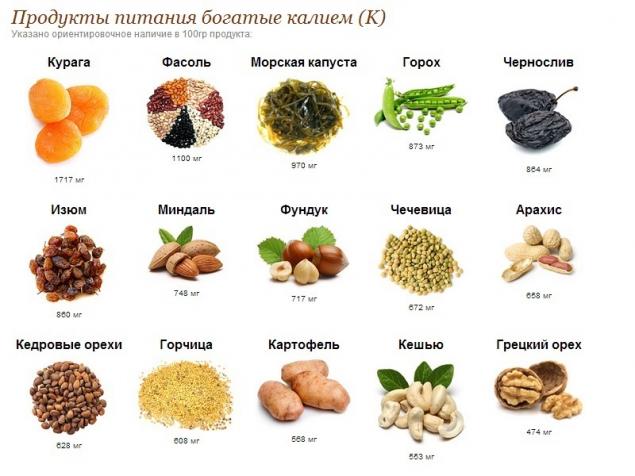
Main functions of potassium in the body:
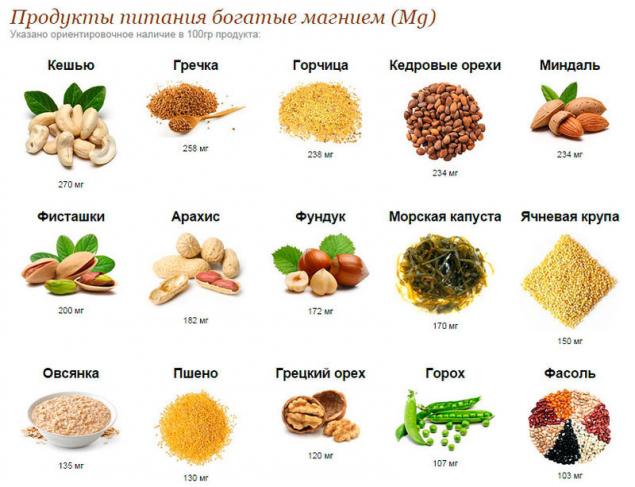
Excessive consumption of coffee, sugar, alcohol; preparations of cortisone, laxative remedies, colchicine, and stress hinder the absorption of potassium, whilevitamin B6, sodium, neomycin contribute to the process.
Lack of potassium leads to disruption of the cardiovascular system, can cause muscle weakness. Prolonged potassium deficiency may cause cardiac arrest.Signs of potassium deficiency:
A constant excess of potassium and sodium causes a rise in insulin levels in the blood. There is other hormonal disorders. The accumulation of potassium in the blood, hyperkalemia (at concentrations above 0.06 percent) leads to severe poisoning, accompanied by paralysis of skeletal muscles; potassium concentration in the blood exceeding 0.1%, death occurs. Long continuous use of potassium drugs can cause weakening of the contractile activity of cardiac muscle, therefore, in such cases, instead of potassium sodium prescribed drugs. The development of hyperkalemia contributes to the acidosis.
The main symptoms of excess potassium:

People with an excess of potassium is normally high-strung, vulnerable, hyperactive, suffer from excessive sweating, accelerated urination. Potassium food sources: dairy products, fish, meat, including poultry meat;
fruits, especially cherries (contents in the ash – 90-600 mg%): apricots, avocados, plums, pineapples, oranges, watermelon, bananas, grapes, cherries, pomegranates, melons, figs, kiwi, dogwood, gooseberries, peaches, plums, red currants, black currant, feijoa, persimmon, cherry, mulberry, apples;
dried fruits: raisins, dried figs, dried apricots, dates, prunes;
cereals and legumes: beans, peas, buckwheat, corn, oats, millet, soft wheat, durum wheat, unpolished rice, rice wild, rye, soybeans, beans, lentils, barley; whole grain, bran;
vegetables: ginger, potato, zucchini, cabbage, broccoli, Brussels sprouts, kohlrabi, cabbage, red, carrots, hot pepper (chili), radish, black radish, beets, tomatoes, parsnips, parsley, celery, asparagus, turnips, rutabaga, Jerusalem artichoke, pumpkin, horseradish, garlic;
herbs: Basil, coriander (cilantro), green onions, leeks, chives, parsley, stalks rhubarb, arugula, lettuce, green celery, dill, leeks, green garlic, spinach, sorrel, tarragon;
nuts and seeds: peanuts, cashews, sesame seeds, poppy seeds, macadamia, almonds, Brazilian nuts, walnuts, pine nuts, sunflower seeds, pumpkin seeds, pistachios, hazelnuts; vegetable oils: pumpkin seed oil; yeast;
mushrooms: white mushrooms, oyster mushrooms, chanterelles, mushrooms, mushrooms. published
P. S. And remember, only by changing their consumption — together we change the world! ©
Source: www.pharmacognosy.com.ua/index.php/makro-i-mikro-chudesa/kaliy-regulyator-serdechnyh-sokrashcheniy
Potassium (K)
In the human body potassium is involved in the intracellular metabolism, regulating heart rate and fluid and electrolyte balance is an important regulator of metabolism and the osmotic pressure, is involved in the activities of the nervous system. It happens due to potassium the transmission of nerve impulses from neuron to neuron.

In the body is maintained a constant level of potassium daily requirement in it is 2-5 In USA rekomenduetsyadlya the value of the daily intake of potassium is established in the amount of not less than 2,000 mg for persons 18 years of age. For older people, this value is added to the number of years lived (for example, for people aged 50 years this figure is equal to 2000 + 50 = 2050 mg).
The daily recommended intake of potassium for athletes and people engaged in heavy labor –2,5–5 g.
The bioavailability of potassium by the body is 90-95%.
The total content of potassium in the body – from 160 to 250 g (approximately 0.23 percent of the total body mass). Excretes potassium in the kidneys because of its diuretic action. The biological role in the human body. Potassium is one of the most important electrolytes in the body. Like sodium, it is of great importance in the formation of buffer systems, which prevent change of the reaction of the internal environment and ensure its sustainability. Potassium along with sodium regulates the water content inside cells. Provides support for the electrical potential in nerves and on the surface of cell membranes than is regulated by muscle contraction. Potassium is involved in the mechanism of accumulation of glycogen – the main energy source in the cell. Potassium activates several enzymes. Violation of the potassium–sodium balance leads to a violation of water metabolism, dehydration, weakening of the muscles. Potassium is necessary: in case of insufficiency of the heart muscle, cardiac arrhythmias, fluid retention in the body, hypertension.

Main functions of potassium in the body:
- maintaining constancy of the composition of the cell and the intercellular fluid,
- maintaining acid–base balance,
- ensuring cell-cell contacts,
- the provision of bioelectrical activity of cells,
- the maintenance of neuromuscular excitability and conduction,
- involved in neural regulation of heart rate,
- maintaining water–salt balance,
- maintenance of osmotic pressure,
- the role of a catalyst in the metabolism of carbohydrates and proteins;
- maintaining normal blood pressure levels
- participation in maintenance of function of kidneys.

Excessive consumption of coffee, sugar, alcohol; preparations of cortisone, laxative remedies, colchicine, and stress hinder the absorption of potassium, whilevitamin B6, sodium, neomycin contribute to the process.
Lack of potassium leads to disruption of the cardiovascular system, can cause muscle weakness. Prolonged potassium deficiency may cause cardiac arrest.Signs of potassium deficiency:
- increased dryness of the skin,
- acne
- frequent colds,
- deterioration of mental activity,
- nervousness,
- insomnia,
- reduced reflex function
- depression,
- constipation,
- diarrhea,
- swelling,
- intolerable thirst,
- intolerance to glucose,
- slowing growth,
- the increase in cholesterol levels,
- low blood pressure,
- muscle fatigue and weakness
- nausea and vomiting,
- periodic headaches.
A constant excess of potassium and sodium causes a rise in insulin levels in the blood. There is other hormonal disorders. The accumulation of potassium in the blood, hyperkalemia (at concentrations above 0.06 percent) leads to severe poisoning, accompanied by paralysis of skeletal muscles; potassium concentration in the blood exceeding 0.1%, death occurs. Long continuous use of potassium drugs can cause weakening of the contractile activity of cardiac muscle, therefore, in such cases, instead of potassium sodium prescribed drugs. The development of hyperkalemia contributes to the acidosis.
The main symptoms of excess potassium:
- anxiety,
- irritability,
- anxiety
- sweating;
- muscle weakness,
- degenerative neuromuscular disorders;
- neurocirculatory dystonia;
- arrhythmia;
- the weakening of the contractile ability of the heart muscle;
- paralysis of skeletal muscles;
- intestinal colic;
- frequent urination;
- a predisposition to the development of diabetes.

People with an excess of potassium is normally high-strung, vulnerable, hyperactive, suffer from excessive sweating, accelerated urination. Potassium food sources: dairy products, fish, meat, including poultry meat;
fruits, especially cherries (contents in the ash – 90-600 mg%): apricots, avocados, plums, pineapples, oranges, watermelon, bananas, grapes, cherries, pomegranates, melons, figs, kiwi, dogwood, gooseberries, peaches, plums, red currants, black currant, feijoa, persimmon, cherry, mulberry, apples;
dried fruits: raisins, dried figs, dried apricots, dates, prunes;
cereals and legumes: beans, peas, buckwheat, corn, oats, millet, soft wheat, durum wheat, unpolished rice, rice wild, rye, soybeans, beans, lentils, barley; whole grain, bran;
vegetables: ginger, potato, zucchini, cabbage, broccoli, Brussels sprouts, kohlrabi, cabbage, red, carrots, hot pepper (chili), radish, black radish, beets, tomatoes, parsnips, parsley, celery, asparagus, turnips, rutabaga, Jerusalem artichoke, pumpkin, horseradish, garlic;
herbs: Basil, coriander (cilantro), green onions, leeks, chives, parsley, stalks rhubarb, arugula, lettuce, green celery, dill, leeks, green garlic, spinach, sorrel, tarragon;
nuts and seeds: peanuts, cashews, sesame seeds, poppy seeds, macadamia, almonds, Brazilian nuts, walnuts, pine nuts, sunflower seeds, pumpkin seeds, pistachios, hazelnuts; vegetable oils: pumpkin seed oil; yeast;
mushrooms: white mushrooms, oyster mushrooms, chanterelles, mushrooms, mushrooms. published
P. S. And remember, only by changing their consumption — together we change the world! ©
Source: www.pharmacognosy.com.ua/index.php/makro-i-mikro-chudesa/kaliy-regulyator-serdechnyh-sokrashcheniy



